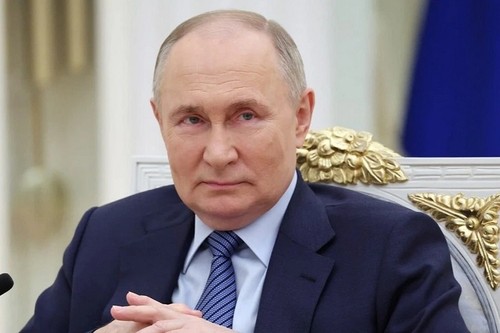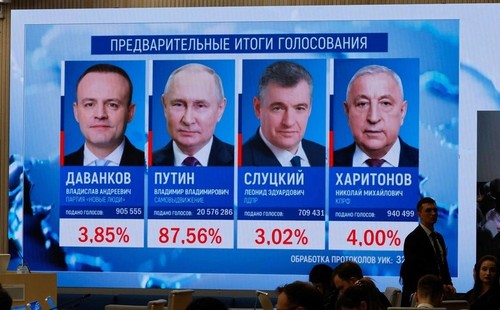 President Vladimir Putin (Photo: Reuters) President Vladimir Putin (Photo: Reuters) |
According to initial results announced by the Russian Central Election Committee on Sunday after counting nearly 84% of the votes, incumbent Russian President Vladimir Putin had 88% of the votes while the other 3 candidates each had 3-5%.
Unity strengthened in Russia
The outcome shows Putin has won one of the most overwhelming victories in Russia’s political history and will continue to hold power for the next 6 years. This is Putin's 5th presidential term. He first held the position in 1999.
In addition to a record percentage of votes for Putin, the turnout of Russian voters (74%) is also the highest in Russian presidential elections, much higher than the 68% who turned out in 2018. These numbers show that the vast majority of Russian voters still have faith in President Putin and reflect greater solidarity in Russia despite external pressure. Putin said the high turnout showed that the Russian people are very aware of the challenges facing the nation.
“That's why voter turnout is at a record high. People vote to consolidate internal politics in order to move forward. Solidarity will allow us to respond effectively on the front line, develop the economy and people, and fulfill development goals. We have big development projects and the Russian people are aware of that. They voted to make Russia stronger," said President Putin.
According to observers, Putin's overwhelming victory was predictable because the rate of support for the Russian President has been high for many years. The Russian presidential election delivered an indicator of the current attitude in Russian society after more than 2 years of conflict in Ukraine and tense geopolitical confrontation between Russia and Western countries. Angela Stent, Senior non-resident Fellow at the Brookings Institution and senior advisor with the Center for Eurasian, Russian and East European Studies at the Georgetown School of Foreign Service, believes there are two things that Western countries should note about the Russian election: how did the Russian voters respond to the current context and will there be post-election changes in Russian policy, especially related to the Ukraine conflict?
 Priliminary results of the Russian Presidential Election on March 17 (Photo: Reuters) Priliminary results of the Russian Presidential Election on March 17 (Photo: Reuters) |
Thomas Graham, a distinguished fellow at the Council on Foreign Relations and Sabine Fischer, a senior fellow in the Eastern Europe and Eurasia research division of the German Institute for International and Security Affairs of Germany emphasized the Russian voter turnout and the number of votes for candidate Vladislav Davankov of the “New People” party, who is considered to have the most pro-Western views among the 4 candidates. If those figures are considered, the results of the Russian Presidential election are clearly not positive for the West, as the voter turnout and support for President Putin were record high while candidate Davankov received just 4% of the votes, ranking 3rd out of 4 candidates.
Prolonged challenge
His overwhelming victory brought greater political resources to Putin, reinforcing Russia's recent policy choices on security, foreign affairs, and economics. However, it will not be easy to find a quick political-diplomatic solution to the Ukraine conflict. Russian voters are probably more concerned about developing the economy and maintaining stability in Russia during the prolonged Western economic sanctions. This is one of the biggest concerns of young voters in Russia.
Zaurbek Burnatsev, a young man from Vladikavkaz and self-described member of the “Putin generation”, said: “What do I want? First, I want security and prospects for the future, growth and opportunities. As I observe now, things are better than before. Hopefully things will get better, not worse."
Before the election, Putin introduced several economic development plans. In his annual address on February 29, Putin praised the resilience of the Russian economy over the past two years, saying Russia achieved a strong economic growth rate last year (3.6%), higher than any other country in the G7. He expressed his confidence that Russia will soon become one of the world’s four largest economies if Gross Domestic Product (GDP) is calculated on power parity purchase (PPP).
But experts say that although the Russian economy grew better than expected in the past two years, Russia still has many big challenges ahead, including high inflation (7.7%), heavy dependence on energy revenues, accelerated changes in economic structure to respond to Western sanctions, and security risks if the conflict in Ukraine gets out of control.